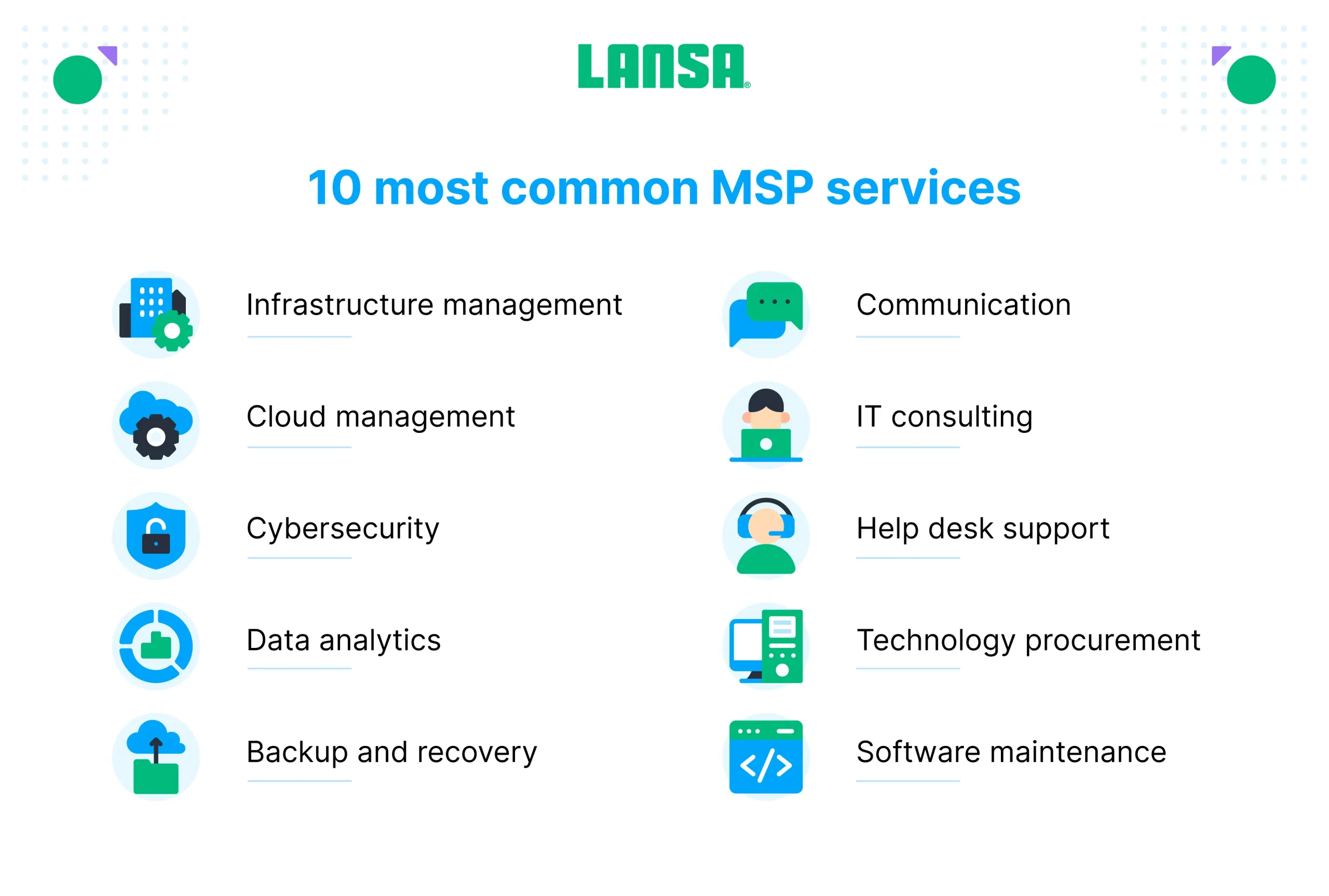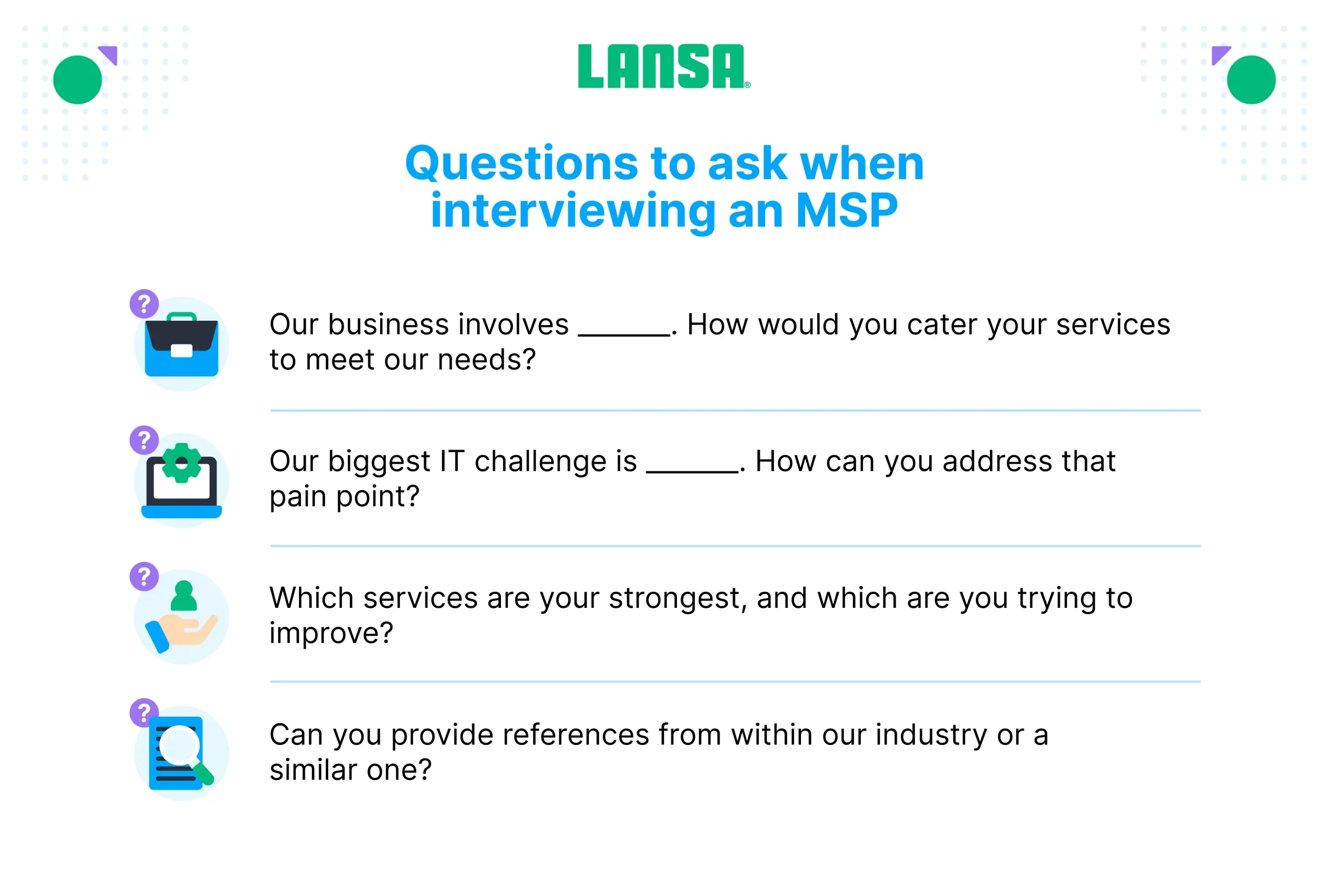Choosing the right MSP for your business can be challenging, especially with many providers making alluring promises. But by taking a systematic approach to identifying the right one, you can quickly pinpoint the best fit. Here are 13 tips you can use as a checklist as you figure out which MSP will do the best job of handling your IT needs.
Key Insights
- Your business needs — instead of the MSP’s portfolio of services — should drive your decision-making.
- You need a provider who can meet both your short- and long-term goals, providing a scalable, extended partnership.
- The track record and customer support of the MSP may be as important as the staff’s technical skills — especially if you’re considering an extended partnership.
- LANSA’s application development services give you a more effective and customized software environment
1. Assess Your Business Needs
As you explore how to choose an MSP, remember that every business is unique, and even those with similar offerings tend to have different IT needs. Before committing to an MSP, you should assess your business needs using the following questions:
- What is our current IT setup? You need an MSP that can adjust to your environment, so taking an inventory of the software, hardware, and systems you are running is a good starting point.
- What are our pain points? By identifying your pain points, you create a to-do list for your MSP. You can then ask each MSP you are considering how they would tackle these challenges.
- What does the future look like for our business? Your IT infrastructure is a major building block for the foundation of your future, so you want to choose an MSP that can support the vision and growth of your organization.
- What are our compliance considerations? Your MSP should understand how to operate within the compliance requirements of your industry. By making a list of the compliance considerations that apply to your IT workflows, you make it easier to check off which ones each MSP can handle.
2. Ensure your MSP Understands Your Business
It is best to find an MSP who already understands the basics of your business, putting them in a position to make a positive impact right away. This is especially true when it comes to developing IT strategies to help your organization thrive. These may involve specialized software, security, compliance, and networking considerations [1].
3. Review Their Services Portfolio
An MSP’s portfolio of services needs to align with your business’s specific needs. For example, many MSPs handle cybersecurity, but if you also need application development services, you want to make sure that it’s available.
Some common services include [2]:
- Building software to improve your operational efficiency or to automate time-consuming workflows.
- Designing and implementing business intelligence solutions.
- Evaluating your current applications and then making improvements to boost their effectiveness.
- Transitioning software hosted on-premises to the cloud.
- Building supplemental functions into existing software environments, such as additional modules or cybersecurity.
4. Evaluate Technical Expertise
The technical expertise of your MSP team is critical because if they have a deep skill set, they may be able to finish the job faster and with higher quality. For example, just because two MSPs claim they can transition your on-premises infrastructure to the cloud does not mean both of their solutions will be equally effective.
This is key as you explore how to choose an MSP. You’ll want to verify each MSP’s technical expertise by checking the apps they use, the environments they can work within, the architectures they’re comfortable with, and the variety of challenges they can address — and how they approach them.
5. Check Industry Experience
Nothing beats experience in IT because it is the best teacher, especially when it comes to problem-solving. As you evaluate the experience of each provider, you should check:
- Whether they have significant experience in your industry.
- The number of years they have been in business.
- Their client base, specifically to see which kinds of companies have entrusted their IT to the MSP.
6. Test Communication and Responsiveness
As is the case in any business relationship, you need a service provider that is both responsive and communicative. With IT management, it is common for time-sensitive questions or concerns to pop up, so your MSP should be:
- Available when you need them, whether that is 24/7 or during certain business hours.
- Willing to communicate via your preferred channels, such as via phone, live chat, videoconference, or email.
- Able to address your needs adequately within a short time frame. This often comes down to the expertise of the staff that is available.
7. Consider Scalability
Figuring out how to choose an MSP involves your current and future needs. Scalability, when it comes to an MSP, encompasses more than being able to add more users, software instances, or virtual workstations. They should be flexible with the plans they provide.
For instance, your software development needs may increase, but your employee base may stay relatively the same. Your MSP should be able to accommodate growth in a single area without forcing you to upgrade to a significantly more expensive service package.
8. Look for a Proven Track Record (References & Reviews)
It is okay to ask for references and check each one. It is not about a lack of trust; it is just good business. There is no better indication of future performance than how an MSP has supported previous customers. Therefore, it’s good to ask questions such as:
- How long have you been with this MSP, and has their level of service remained the same, improved, or gotten worse?
- What kind of services do they provide, and how would you rate each one?
- When you have an issue or request, are you satisfied with their level of responsiveness?
- Since you have been working with this MSP, have you experienced any lost data or downtime? If so, how did they respond?
9. Evaluate Customer Support
When evaluating the customer support of each MSP, you want to consider how available they are and, when they cannot respond right away, how quickly they can get back to you. They also need to be able to meet with you digitally on your terms — even if that means connecting while on the road or in a hotel via an app on a personal device.
In addition, you should pay close attention to how their reps respond to your questions during the interview process. Are they attentive and patient, or do they provide canned, casual answers?
10. Look for Proactivity
Your MSP should be more than a troubleshooting resource; they should proactively design solutions to prevent problems and get the most out of opportunities [3]. In this way, you get a partner who can help you avoid downtime, data loss, and anything else that could disrupt continuity.
For example, a quality MSP may suggest ways to set up a backup and recovery system that fits your operational and resiliency needs. A good MSP may also recommend more efficient ways of building apps for your business or methods of getting more out of cloud services.
11. Examine Cost vs. Value
A high upfront cost should not necessarily scare you off as you look into how to choose an MSP — just as a low cost shouldn’t automatically seal the deal. Your decision is about value, which involves the quality of services, how your MSP limits downtime, and how they may be able to optimize the efficiency of your IT. Each of these factors can improve the bottom line of your business, giving your MSP tangible value.
12. Analyze Technological Capabilities
To assess the technological strengths and weaknesses of an MSP, you should ask about which certifications staff members have, their experience with the technologies you need, and how they use IT to help a business reach its objectives.
It is equally important to assess industry-specific skills. For instance, a team of experts that supports eCommerce companies may have different skill sets than those that serve manufacturers.
13. Consider Long-Term Partnership Potential
Ideally, you want an MSP that can deliver value consistently for years. A long-term partnership gives you reliable IT experts who can grow and flex with your organization. Finding the right long-term partner involves making sure they have a track record of attracting and retaining professionals with the skill sets you need. On the other hand, if they experience high turnover and constantly have to train new staff, this could limit the potential for a long-term partnership.
Making the Final Decision
Your final decision will boil down to which MSP can meet your business’s goals while providing expert services and high-quality customer service and communication. By making a list of what you need to grow in the coming months and years, you can identify the best choice. LANSA’s MSP solution gives you access to an expert, flexible team of developers and maintenance professionals who understand how to help you grow. Reach out to us today to learn more about how LANSA Professional Services can help your organization reach its goals.
Resources
- “What Are IT Strategies? (With Importance and How to Develop),” Indeed.com, Jul. 01, 2024. https://ca.indeed.com/career-advice/career-development/it-strategies (Accessed Jul. 29, 2024).
- “Managed Service Provider (MSP),” Gartner.com, 2024. https://www.gartner.com/en/information-technology/glossary/msp-management-service-provider#:~:text=A+managed+service+provider+(MSP,a+third%2Dparty+data+center (Accessed Jul. 29, 2024).
- “What is a Managed Services Provider (MSP)?” CompTIA. https://connect.comptia.org/content/articles/what-is-msp (Accessed Jul. 29, 2024).






